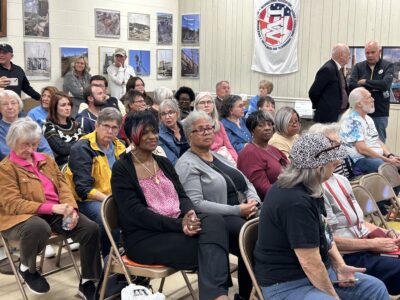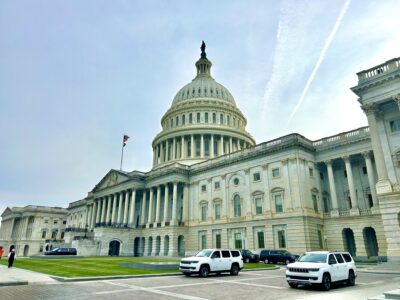West Virginia, Diversified Energy Announce Partnership To Plug More Than 1,000 Old Wells Around State
CHARLESTON — A major natural gas producer is teaming up with West Virginia on a 20-year plan to fund the plugging of more than 1,000 orphaned wells in the state.
Gov. Patrick Morrisey joined Diversified Energy CEO Rusty Hutson, Jr. in Bridgeport Thursday afternoon to announce the creation of the Mountain State Plugging Fund, which they called the nation’s first dedicated financial assurance initiative for retiring oil and gas wells.
“This is a wonderful day,” Morrisey said. “When Rusty first approached me about this, my immediate reaction was this is a triple winner. This is going to strengthen our energy future. It’s going to protect our environment, and it’s going to create good, high-paying jobs for the Mountain State. And you know what? It doesn’t cost the taxpayers one penny.”
“This is a big day,” Hutson said. “It’s an absolute cutting edge program that we’re entering into here with the State of West Virginia…This is the first time it’s ever been accomplished. No state agency has done this up to this point.”
According to Hutson, Diversified Energy will commit $70 million over the next 20 years to the Mountain State Plugging Fund. The funding will be guaranteed by the insurance provider OneNexus, providing up to $650 million of financial protection over time. The Mountain State Plugging Fund will ensure that Diversified Energy’s natural gas and oil wells are safely plugged and retired without expense to West Virginia’s taxpayers.
“What I love about this product that we’re rolling out today is that it outlasts me. It outlasts the governor. It outlasts the (state Department of Environmental Protection),” Hutson said. It’s going to be in place, and it will go on for decades and will take all of the burden off the taxpayers. That was something that was very, very important to us as we looked at it.”
The agreement between the state and Diversified Energy also mandates that the company, through its subsidiary Next LVL Energy, will retire at least 1,500 natural gas and oil wells in the first two decades, or approximately 250 wells per year when fully implemented. Both Morrisey and Hutson said this plan will help create between 50-100 jobs in the oil and natural gas industry with average salaries of $70,000 and help improve the environment.
“That’s a great opportunity for the Mountain State,” Morrisey said. “I’m hopeful that through today’s announcement, this is just going to be the beginning in the series for the Mountain State. Because the truth is today is about the wonderful partnership between the State of West Virginia and Diversified. But there’s still a lot of other wells that need to be plugged.”
According to a 2024 report from West Virginia University’s Bridge Initiative in Science and Technology Policy, Leadership, and Communications, there were more than 6,500 documented orphaned oil and natural gas wells in the state, defined as abandoned wells that have been idle for 12 months or more. However, when factoring in undocumented wells, that number grows to more than 21,000.
When the owner of a well cannot be identified, it becomes the state’s responsibility for plugging the well, but doing so is a costly endeavor. According to the WVU Bridge Initiative, the average cost for plugging a well is approximately $50,000 per well, though that cost can increase depending on the type of well and the terrain.
West Virginia has an Oil and Gas Reclamation Fund where forfeited bonds paid by companies for drilling vertical and horizontal oil and gas wells are deposited. However, there is a question about whether existing bond rates are high enough to avoid putting most of the cost for plugging orphaned wells directly on West Virginia taxpayers through the Department of Environmental Protection.
“I sponsored a couple of little bills through the Legislature that created little trickles of money for well plugging. So, it’s an issue that I was on a long time ago,” said Del. Bill Anderson, R-Wood, chairman of the House Energy and Public Works Committee.
“I think this is a monumental step forward,” Anderson continued. “It is a basically private industry stepping up to partner with our DEP to deal with the long-term environmental problems that have legacy issues that have been handed to us for more than 100 years. Anything we can do to improve well plugging and improve the quality of everything in the state, I am behind.”
Some orphaned wells have been sitting abandoned for decades, causing air pollution through methane emissions, or groundwater contamination from the slow leaking of oil and other contaminants.
Earlier this year, Morrisey signed House Bill 3336, creating an inexpensive way to cap abandoned wells. The bill allows oil and natural gas companies to plug abandoned wells by piercing the outer casing and pumping cement into the well. Prior to the passage of HB 3336, companies were required to remove most of a well’s equipment.
“I was happy to sponsor the bill, and I think this is a great continuation of that effort,” said Del. Mark Zatezalo, R-Hancock, the vice chairman of the House Energy and Public Works Committee. “If we can pull more people into this type of a program, it can only be a benefit.
“I don’t know how many of you know, but there are thousands of wells in the state that are abandoned,” Zatezalo continued. “You can argue how much environmental damage they do, but the fact that they’re open is something that you cannot overlook. The more aggressive we are with that, the better off we’re going to be.”
West Virginia has also received some federal funding for capping orphaned wells. The 2021 Infrastructure Investment and Jobs Act included $4.7 billion for orphaned wells, with West Virginia already receiving $56.2 million through the U.S. Department of the Interior’s Orphaned Wells Program Office.






